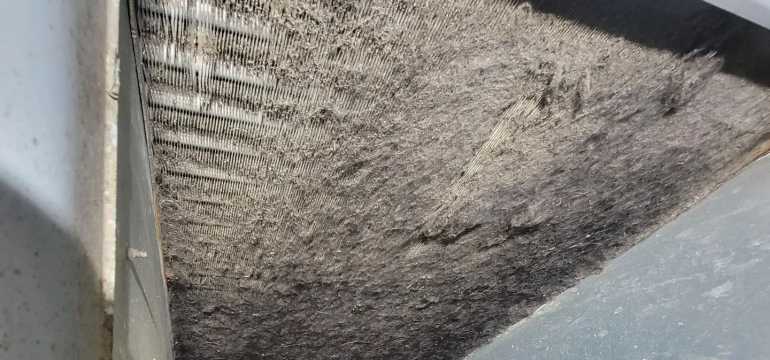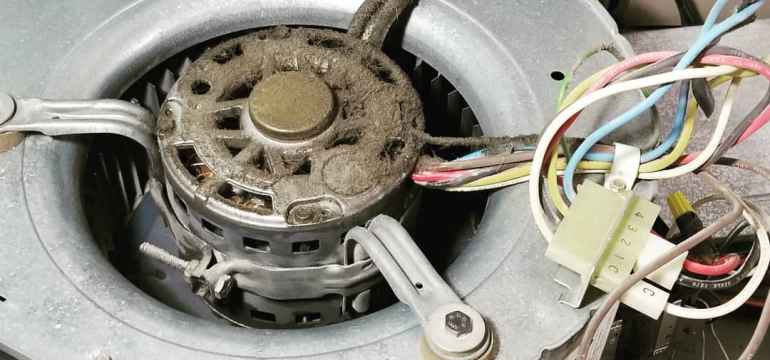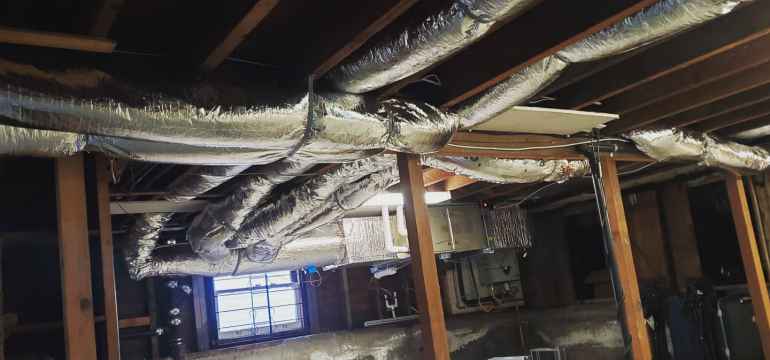Nobody enjoys discovering that their air conditioner line has frozen—especially if it happens during the warm summer months.
But if you take the right steps, you can find the source of the problem, fix it quickly, and get back to enjoying your air conditioning instead of having to worry about your AC lines constantly freezing up.
This article will help you do that. Keep reading to discover why your air conditioner might have a frozen pipe outside or inside and what to do about it.
Common reasons why AC lines freeze up
- Dirty or clogged air filters
- Blocked AC vents
- Refrigerant leaks
- Dirt accumulation—especially over the coils
- Fan failure
- Air duct leakage
If you think you might be experiencing one of these issues, don’t worry. We’ll tell you what to do about it in the sections below.
Here’s what to do when your air conditioner line is frozen
-
Turn the system off and let the ice thaw
You should turn off your air conditioner as soon as possible after you detect a frozen line. This won’t fix the problem, but it will give your air conditioner lines time to thaw out. This can protect your system’s compressor from sustaining serious damage.
It can take up to 24 hours for a frozen AC line to thaw out. So don’t try to rush this process.
Keep in mind that the thawing lines will produce water that falls onto the floor. So you’ll likely want to put a towel down or take other steps to minimize any potential damage from that.
When the ice thaws off of the coils, they’ll still need time to dry. This is where the fan comes in. Leaving it on should help to speed up the drying process. If you want it to go by even faster, consider using a hair dryer.
-
Check your air filter
Now we’re ready to start looking for the source of your problem. The first step is to see how your air filter looks. If it’s extremely dirty or clogged, it will reduce airflow to your HVAC system and could lead to freezing.
This could definitely be the source of your problem if you’ve had the windows or doors open more often than usual recently. It might also be your issue if you just haven’t replaced your air filter in a while.
-
Look for blocked and closed vents
Your HVAC system relies on supply vents to distribute the cold air that it creates throughout your home. If too many of these are closed, it can disrupt that process and potentially cause issues like your AC lines freezing up.
If you’ve got lots of blocked or closed vents, try opening them up and running your AC unit again. It may be all that you need to do to fix the issue.
-
Restart your air conditioner
After everything is dried, you can go ahead and restart your air conditioner. Pay close attention to see if your lines begin freezing again. If they do, then it’s time to call a professional.
Why your air conditioner line is frozen?
An air conditioner line freezes because it gets cold. But that can happen for a few different reasons.
For instance, the source of your problem could be:
- Blocked airflow
- A refrigerant leak
- An issue with your blower motor
- Air duct issue
It’s likeliest that your issue stems from either airflow issues or low refrigerant. But we’ll dive a little deeper into each of these potential issues below.
Blocked airflow
Your air conditioner needs a constant flow of air to function. Otherwise, humidity can sit in your machine and the moisture in it can lead to your lines freezing up.
Filters in most AC units need to be changed about once per month to work as well as possible. The longer you wait to do this, the dirtier yours will get. And eventually, that often leads to airflow problems that can cause frozen coils.
The good news is that air conditioner filters are fairly cheap. And they can improve the efficiency of your system by up to 15% when functioning optimally.
Dirty or clogged air filters are the number one culprit behind this issue. But there are some other potential sources for the problem as well.

- A dirty evaporator coil can also diminish your air conditioner’s functionality. It can create a situation where airflow is restricted, and your lines begin freezing up. Evaporator coils can capture some of the dirt and dust that your AC system sucks up. Over time, it’ll almost always get dirty eventually. So it’s a good idea to make evaporator cleaning part of your regular maintenance schedule.
- Your fan or the blower that’s attached to it may also be the source of your airflow issues. These are responsible for pulling warm air into the AC system and pushing cool air out of it. If they aren’t able to do those jobs effectively, then your AC unit will lose a lot of its efficiency. Plus, the airflow issues that arise can, eventually, lead to problems like an air conditioner frozen pipe outside.
- If you close too many supply vents in unused rooms, airflow issues can arise. And that will eventually cause your AC lines to freeze up as well.
- Return vents are also essential to air circulation in your home and your AC system. They’re responsible for pulling air into the unit so that it can climatize it. If you close these, your system will almost always run into issues.
Refrigerant leak
Your frozen line may also be coming from a refrigerant leak, which would cause the pressure in your system to drop. Refrigerant is responsible for taking the heat out of your rooms and pushing it out of your home.
If you don’t have enough refrigerant, ice can start building on your lines. Here’s what to look for if you think you might have a refrigerant leak:
- Suddenly high electricity bills (due to your machine having to work harder)
- Hearing a hissing or a bubbling sound
- Warm air coming from your vents even when the AC is on cold
Blower motor problems
 The source of your problem could also be your blower motor. This draws air into your HVAC system. When it can’t do that, your lines will often begin accumulating ice.
The source of your problem could also be your blower motor. This draws air into your HVAC system. When it can’t do that, your lines will often begin accumulating ice.
Here are some signs of a potential blower motor issue:
- No warm air blowing outside
- Hearing a humming sound
- Your AC has trouble starting up
- You notice your blower fan isn’t spinning as fast as it did previously
Air duct issue

Sometimes, an air duct can either collapse or get a leak. When this happens, airflow is often significantly reduced. And that can lead to your refrigerant lines freezing up.
Sometimes your air duct will just get disconnected, and you can simply reattach it to fix the problem. But you could also have a more serious issue, such as an air duct leak.
Air duct leaks are caused by tears or holes that impact airflow. You typically need an expert to help you deal with these, as they’re tough to spot and fix on your own.
Here are some of the top signs that you have an air duct leak:
- High utility bills without explanation
- Chilled spots on your drywall
- Hearing a loud humming noise while your AC is on
- Uneven heating or cooling
- Lots of dust in your home without explanation
How to stop this from happening in the future
Once you find and fix your problem, your next goal is to prevent it from happening again in the future. There are a few steps you can take to reduce the chances of experiencing another frozen air conditioner line in the future.
First, make sure that you’re changing your air filters regularly. This is a really easy thing to do, and it can have a huge impact on the overall efficiency of your AC unit. For the best results, you’ll want to swap out your filters 4-12 times per year. You’ll need to do it closer to 12 times per year if you have pets or lots of people living in your home.
Additionally, your AC unit has been carefully calibrated to operate within a specific temperature band. If you try to use it outside of that band, you can encounter problems like this.
Investing in a programmable thermostat will help you be more precise with your temperature setting, which could do wonders for the longevity of your system.
Finally, it could make sense to have an HVAC professional come take a look at your system once or twice per year.
They can evaluate your system for proper airflow and complete maintenance tasks that will seriously reduce your chances of experiencing a frozen air conditioner line in the future.
- What to Do if Your House Smells Like Gas but There’s No Leak - February 6, 2023
- Why Is There a Burning Smell Coming From My Vents? - August 16, 2022
- How to Remove the Musty Smell From Your Air Conditioner - August 16, 2022

